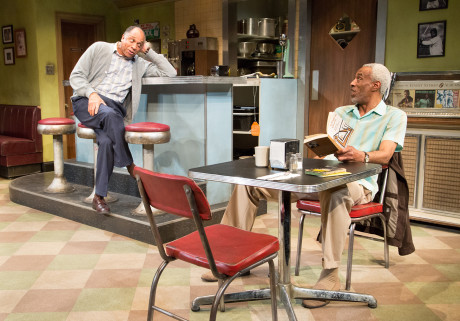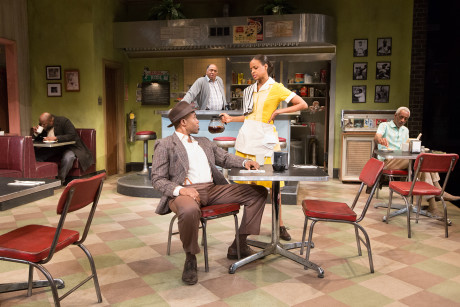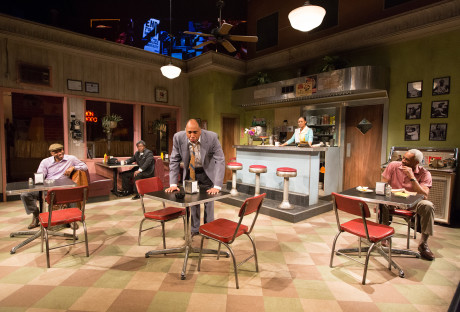It’s 1969, and we’re in a diner in Pittsburgh. The sweet sounds of soul are on the jukebox, and the harsh sounds of revolution are in the air. It’s a time of change in the city’s Hill District: the city government wants to tear down this diner, and most of the surrounding neighborhood, in the name of urban renewal. They call it progress. But is it? Is the African American community of Pittsburgh moving forward, or is it slowly being destroyed?

As it turns out, the people of August Wilson’s Pittsburgh can never truly be defeated. The characters in Wilson’s Two Trains Running never stop fighting for what they deserve, whether it’s money, love, respect, or just some ham. And the Arden’s effervescent new production, directed by Raelle Myrick-Hodges, fleshes out Wilson’s play, subtly expanding it without changing a word.
The people who spend their time at Lee’s Restaurant have a convincing camaraderie. The owner, Memphis Lee (Johnnie Hobbs Jr.), is preoccupied with how much money he can sell his restaurant for. He’s sure the white people in city government are trying to cheat him – but when he turns to West (E. Roger Mitchell), who runs the funeral home across the street, he’s offered another raw deal.
Memphis and his longtime friend Holloway (Damien J. Wallace) sit around the diner and complain about the attitude of young people who spout Black Power slogans like “Black is Beautiful.” As Memphis grumbles, “Sound like they trying to convince themselves…. You don’t hear me say that. Hell, I know I look nice. Got good manners and everything.”
Lest you think they’re just a couple of cranks, Memphis and Holloway will tell you of the hardships and discrimination they’ve endured, in some of Wilson’s most beautifully wrought soliloquies. Like all the characters in Two Trains Running, they’re not just cracking jokes; they have rich inner lives and back stories. Even West, that slippery undertaker, isn’t simply a shallow huckster; the death of his wife has made him question his work and his place in the world.
The younger generation that hangs out at the restaurant includes Wolf (Darian Dauchan), who uses the pay phone to take bets for the local numbers racket; Risa (Lakisha May), the waitress, so outraged by male harassment that she slashed her legs with a razor to make herself less desirable; and Hambone (Kash Goins), a mentally challenged man with a limited vocabulary, repeatedly railing about a ham that a local shopkeeper has owed him for the past nine years.
Into this combustible setting walks Sterling (played by U.R.), just out of prison and looking for work. He’s got big dreams, but he’s restless and unreliable. He needs to start over, and it looks like there may be just one person who can help him: Aunt Ester, a local sage and mystic who, if she can be believed, is over 300 years old. “She’ll change your luck,” Holloway tells Sterling. And if there’s one thing the people in this diner could use, it’s a little luck.
Myrick-Hodges’ production is distinguished by great ensemble work, with each of the actors getting a moment in the spotlight.

Hobbs and Wallace set the perfect tone for the production, with genial performances that command attention without showing off. Dauchan and U.R. serve as a balance, earning laughs without pushing too hard. Mitchell gives West some touching depth, while May plays Risa with subtle forcefulness.
Hambone is the play’s least satisfying character; in some ways he’s a retread of a similarly damaged character in Wilson’s play Fences. But Hambone can be a splendid showcase for a resourceful actor, and Goins is up to the challenge. Eyes squinting, head downcast, concentrating intently, Goins makes the most of the handful of words he’s given. He beautifully handles both sides of a character who swings between comedy and tragedy.
Myrick-Hodges’ production not only brings these characters to life vividly; it also gives us a taste of their inner life. In the opening moments, Goins appears, out of character, to recite some of Wilson’s stage directions and descriptions, and he reappears later to announce character descriptions when those characters make their first entrances. (May handles the description when Goins makes his entrance as Hambone.) It’s a nice touch that adds to the play’s clarity, allowing the audience to connect with the characters instantly.
David P. Gordon’s set gives us a detailed and spacious diner, complete with a scuffed-up floor and weathered furniture left over from a previous era. Gordon also adds painted backdrops at the edges of the stage that offer a sense of the surrounding neighborhood, so we can see the restaurant’s place in the world. And Nicholas Hussong provides video projections during the scene changes, including interview clips of Malcolm X and James Baldwin, that give an idea of what was going on in the world outside, and in the minds of Black America, in 1969.

Mikaal Sulaiman’s sound design uses hit songs of the era, but cuts those songs into loops that anticipate innovations yet to come. He also supplies traffic sounds that seem to get louder as the play goes on, suggesting the highway construction projects that are slowly but steadily encroaching on the neighborhood.
Two Trains Running is an entertaining and involving production. In its own gently insinuating way, it draws the viewer deeply into the lives of its characters, thanks in large part to some tight chemistry and an immensely likable cast.
Running Time: Two hours and 45 minutes, including an intermission.
Two Trains Running plays through April 10, 2016 at the Arden Theatre Company – 40 North Second Street, in Philadelphia, PA. For tickets, call the box office at (215) 922-1122, or purchase them online.
https://youtu.be/ForlCDZpMfw






Will see it tonight. But, the one thing that disturbs me is the “running time”. No author since Shakespeare himself, should write a drama that lasts more than 2 hours, including intermission!